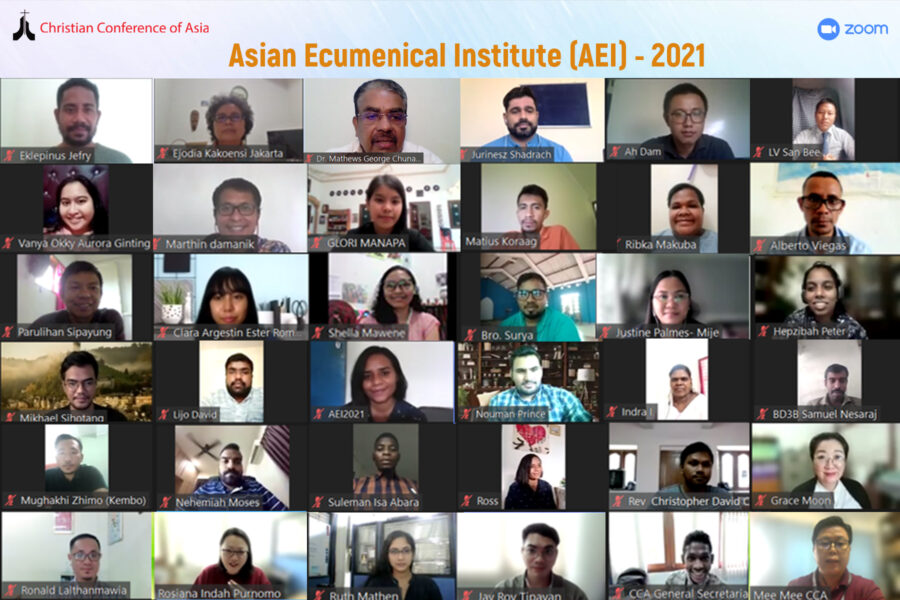Asian Ecumenical Institute (AEI)–2021 commences
 Students of AEI–2021
Students of AEI–2021
The Christian Conference of Asia’s (CCA) annual month-long ecumenical formation and leadership development training course, the Asian Ecumenical Institute (AEI)–2021, commenced on 18 October 2021.
As the COVID-19 pandemic continues to prevent in-person meetings in Asia, the annual programme is being conducted online. 28 young people from across Asia and beyond, selected from a pool of 50 applicants, are attending the training programme that is being held from 18 October to 19 November 2021.
The theme of AEI–2021 is ‘God’s Assurance of Healing and Restoration’. The sessions of AEI–2021 will discuss the ecumenical responses to the challenges of COVID-19 and provide a strong biblical-theological undergirding that will be based on examining God’s promises of restoration through healing and the divine mission of rehabilitating the dignity of creation.
Welcoming the students of AEI–2021, the CCA General Secretary Dr Mathews George Chunakara said, “The CCA is glad to once again organise and initiate this ecumenical formation and leadership development training programme for young prospective ecumenical leaders in Asia and beyond. This year’s course has been designed keeping in mind the role of the ecumenical movement in addressing contemporary challenges and in strengthening not only ecclesial unity but the unity of all of God’s creation.”
The CCA General Secretary assured the participants of the positive learning they could expect to gain from the experience: “Despite not being able to share this fellowship in person, we are confident that the online AEI–2021 will offer great insights and value as well as the space to build ecumenical bridges for you [students] as you journey in different capacities and ministries.”
The faculty of AEI–2021 includes internationally reputed ecumenists, theologians, academicians, and social scientists from different ecclesial traditions who have worked in the global ecumenical movement over the decades, such as Dr Mathews George Chunakara (CCA), Dr Wesley Ariarajah (Sri Lanka), Dr K.M. George (India), Bishop Daniel Thiagarajah (Sri Lanka), Dr Henriette Hutabarat-Lebang (Indonesia), Dr Fernando Enns (Germany), Supaporn Yarnasarn (Thailand), Dr Joas Adiprasetya (Indonesia), Dr Sharon Bong (Malaysia), Shirin Samuel (India), Dr Tik-Wah Wong (Malaysia), Dr Ji Zhang (Australia), Stephen Arulampalam (Sri Lanka), Dr Joseph Komar (Malaysia), and Rev. Ejodia Kakoensi (Indonesia), as well as CCA staff members Rev. Grace Moon, Dr Ronald Lalthanmawia, and Rosiana Purnomo.
The upcoming week will feature sessions on ‘Ecumenism and the Ecumenical Movement in Asia’, ‘Biblical Perspectives on Ecumenism’, ‘Wider Ecumenism: Restoring Harmony among Faith Communities’, and ‘Future of Ecumenism: Challenges and Prospects in Asia’, among others.










